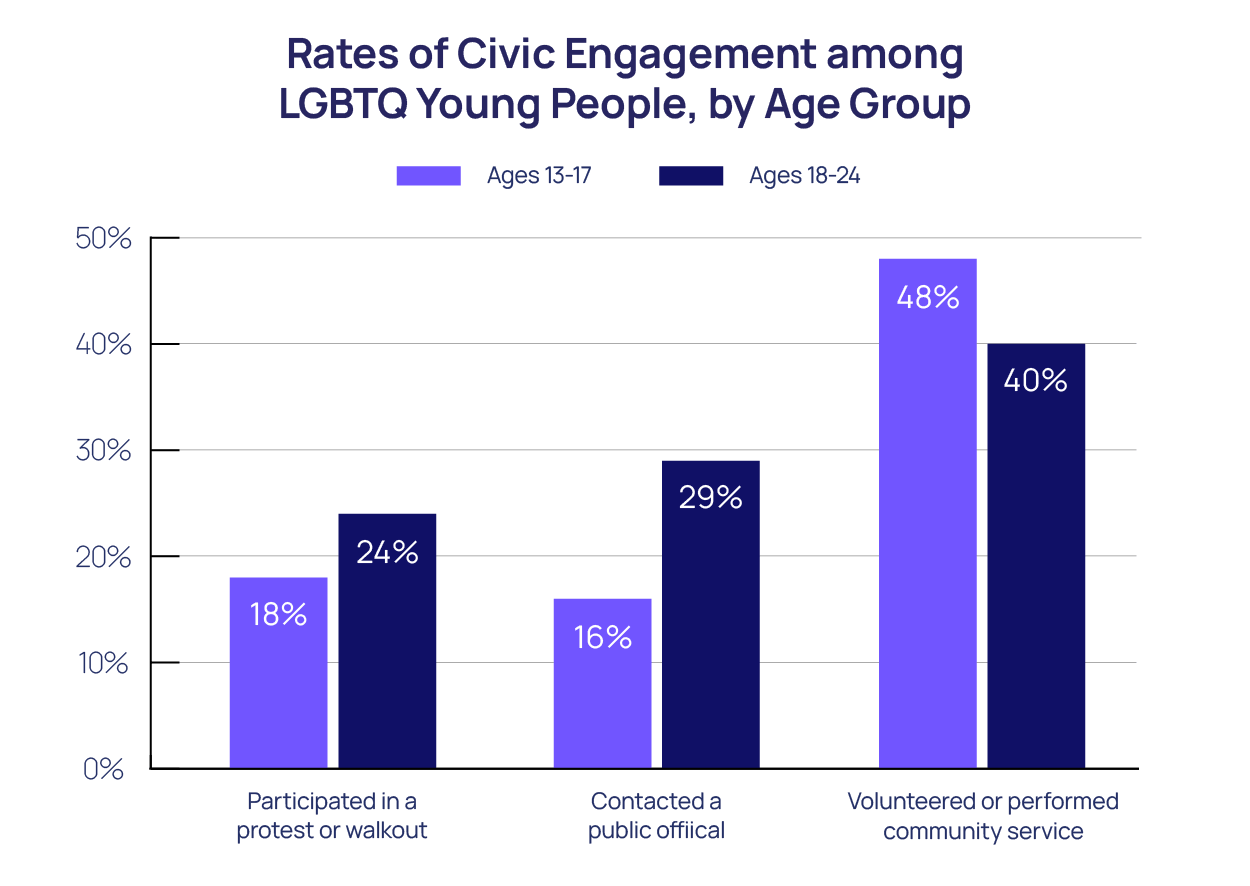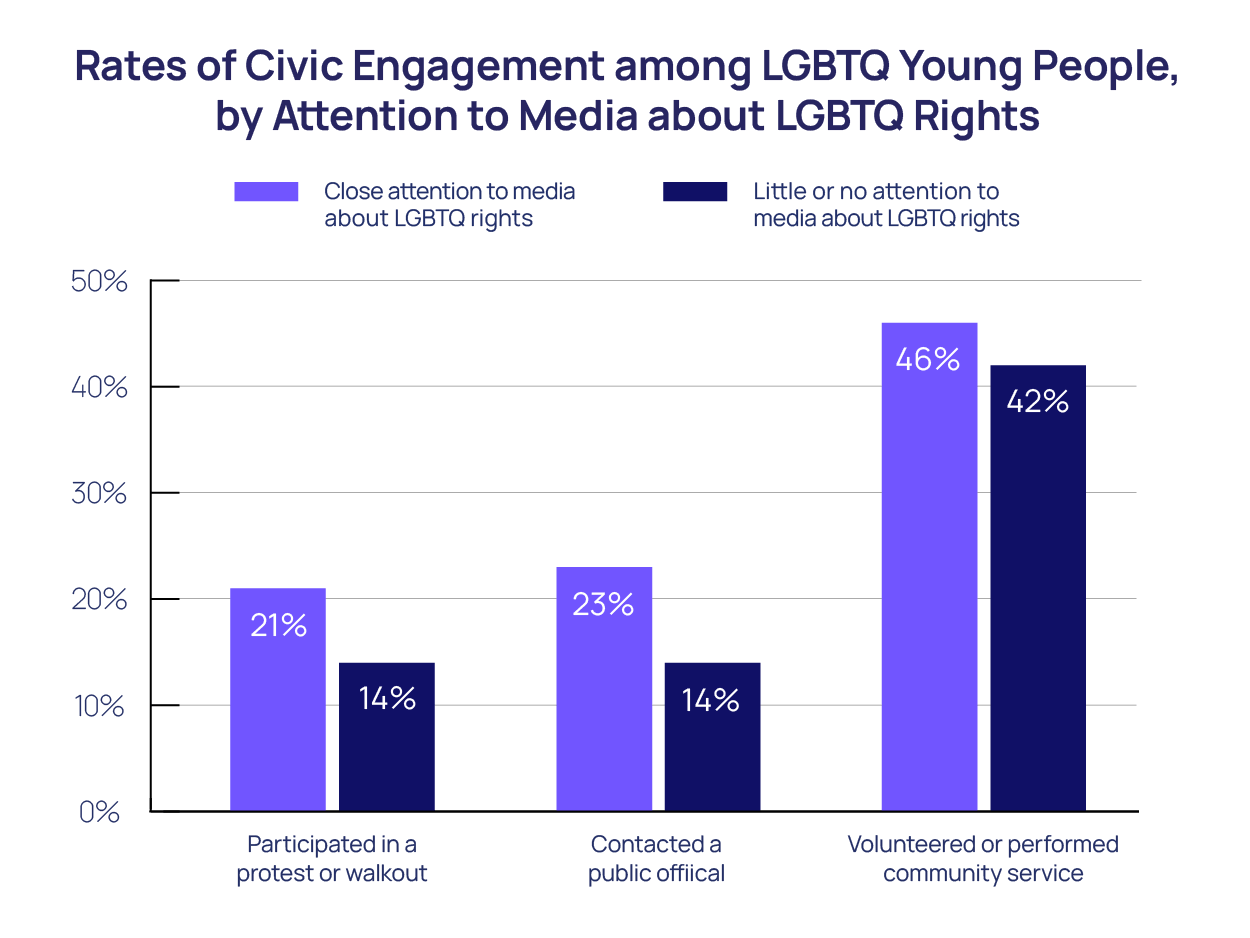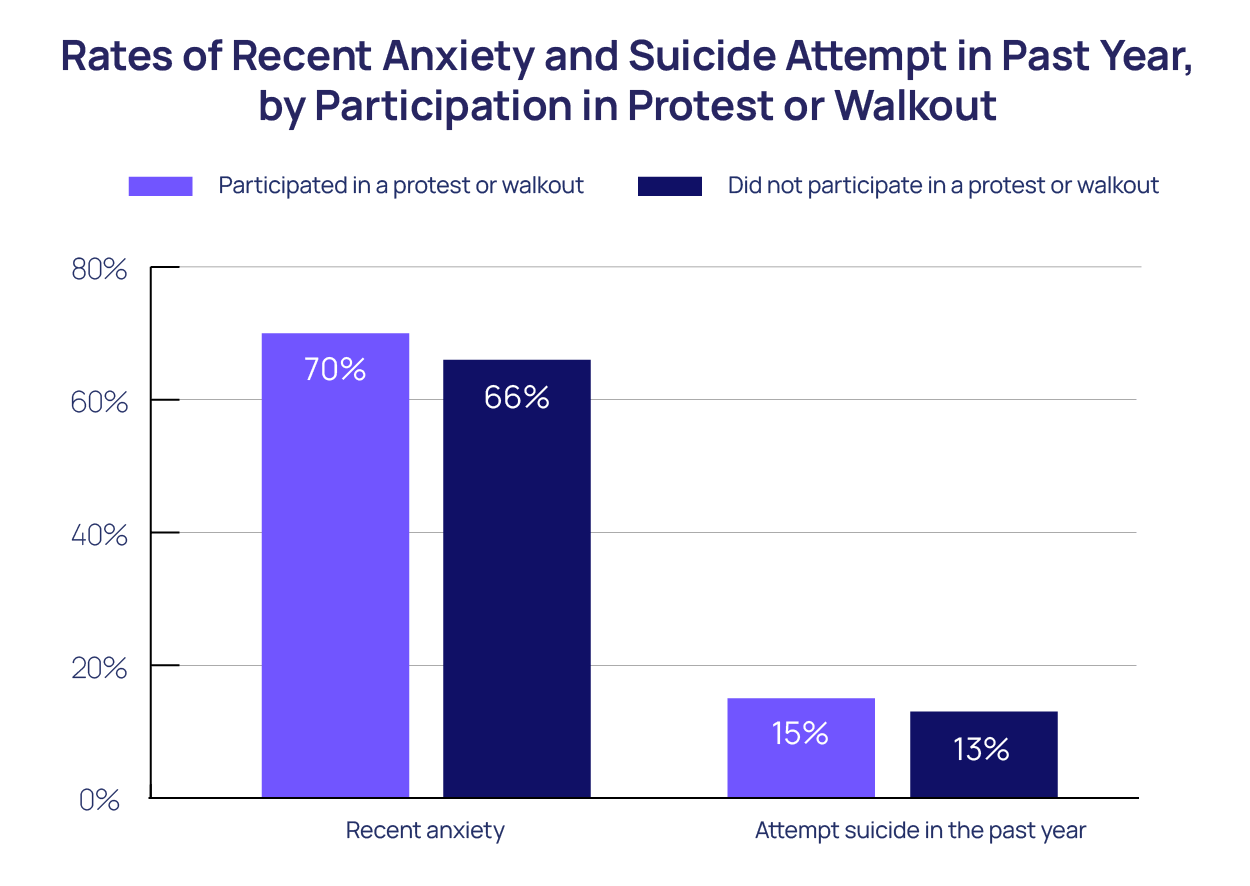Background
This June marks the 54th anniversary of the Stonewall Uprising, a series of protests by LGBTQ patrons of the Stonewall Inn in response to regular police raids and brutal arrests in New York City (Varga et al., 2019). In commemoration of these protests, June has been designated “Pride Month,” a time for the LGBTQ community and allies to gather, celebrate collective accomplishments, and express pride in various life experiences and identities. Protests like the Stonewall Uprising, or today’s Pride Marches, represent just one form of civic engagement – along with various other actions such as voting, volunteering, or community service. Each of these allow citizens to participate in the governance of their community (Nelson et al., 2019). Civic engagement has mixed mental health findings among American young people: traditional forms such as voting or volunteering are associated with better mental health (Ballard et al., 2020; Pilliavin & Siegl, 2014; Wray-Lake et al., 2019), while non-traditional or activist forms of civic engagement, such as participating in a protest or expressing an opinion through the arts, are associated with lower levels of well-being (Ballard et al., 2020). Less is known about the impact of civic engagement among LGBTQ young people, though there is evidence that greater participation in a school-based Gay-Straight Alliance (GSA) is associated with greater civic engagement among high school students (Poteat et al., 2018). In recognition of the Stonewall Uprising and the numerous other protests and civic actions taken for LGBTQ equality, this brief examines rates of civic engagement among LGBTQ young people and its association with mental health, using data from The Trevor Project’s 2023 National Survey on LGBTQ Youth Mental Health.

Results
The majority of LGBTQ young people participated in protests, expressed their opinions to public officials, or performed community service in their local communities in the past year. More than half of LGBTQ young people (58%) reported engaging in one of these three civic actions in the past year. Among the full sample of LGBTQ young people: one in five (20%) participated in a protest or walkout related to local, state, or national politics in the past year; just over one in five (22%) wrote a letter to, emailed, or called a public official, or attended a political meeting in the past year; and, nearly half (45%) volunteered or participated in unpaid community service in the past year. There were differences in rates of the types of civic engagement reported by age group: older participants (ages 18-24) reported more frequently participating in a protest (24%) and contacting public officials (29%) compared to younger participants who were ages 13-17 (18% and 16%, respectively). Conversely, younger participants reported higher rates of volunteering or performing community services (48%) compared to their older peers (40%).

LGBTQ young people who reported paying close attention to media reports about LGBTQ rights reported higher rates of civic engagement. Just over one in five (21%) LGBTQ young people who paid close attention to media reports about LGBTQ rights reported having participated in a protest or walkout in the past year, compared to 14% of their peers who paid little or no attention to media reports about LGBTQ rights. Nearly one in four (23%) LGBTQ young people who paid close attention to media reports about LGBTQ rights reported having contacted a public official in the past year, compared to 14% of their peers who paid less attention to media reports about LGBTQ rights. Nearly half (46%) of LGBTQ young people who paid close attention to media reports about LGBTQ rights reported having volunteered or performed community service in the past year, compared to 42% of their peers who paid less attention to media reports about LGBTQ rights.
Civic engagement among LGBTQ young people was associated with higher odds of both recent anxiety and attempting suicide in the past year, which highlights a need to support LGBTQ young people who are advocating for themselves. All three forms of civic engagement were associated with higher odds of recent anxiety: participating in a protest or walkout was associated with 15% higher odds (aOR = 1.15 [CI = 1.07, 1.24], p<0.001), contacting a public official was associated with 13% higher odds (aOR = 1.13 [CI = 1.05, 1.21], p<0.01), and volunteering or performing community service was associated with 16% higher odds (aOR = 1.16 [CI = 1.10, 1.24], p<0.001). Both LGBTQ young people who had participated in a protest or walkout and those who had contacted a public official reported 31% higher odds of attempting suicide in the past year, compared to their peers who had not taken these civic actions (aOR = 1.31 [CI = 1.18, 1.45], p<0.001, and aOR = 1.31 [CI = 1.18, 1.45], p<0.001, respectively).

Methods
Data were collected from an online survey conducted between September and December 2022 of 28,524 LGBTQ youth recruited via targeted ads on social media. The item assessing civic engagement asked respondents, “In the past year, have you: Participated in a protest or walkout related to local, state, or national politics? Written a letter or email, called a public official, or attended a political meeting? Volunteered or done unpaid community service?” Response options were 1) No, and 2) Yes. Young people’s attention to media reports about LGBTQ rights was assessed via a question that asked, “To what extent do you pay attention to media reports about rights for people who are LGBTQ?” Response options were 1) Not at all, 2) A little bit, 3) Somewhat, and 4) A lot. This variable was recoded so that respondents who reported paying Somewhat or A lot of attention were coded as “1” and responses of “A little bit” or “Not at all” were coded as “O”. Recent anxiety was assessed using the GAD-2 (Plummer et al., 2016), and past-year suicide attempts were assessed using a question from the Centers for Disease Control and Prevention’s Youth Risk Behavior Survey (Johns et al., 2020). Crosstabs and chi-square analyses were used to examine frequencies and differences in rates among different groups. Adjusted logistic regression models were conducted to determine the association between paying attention to media reports about LGBTQ rights, recent symptoms of anxiety, attempting suicide in the past year, and civic engagement in the past year while controlling for age, Census Region, socioeconomic status, race/ethnicity, gender identity, and sexual identity. All reported comparisons and adjusted odds ratios are statistically significant at least at p<0.05. This means that there is less than a 5% likelihood these results occurred by chance.
Looking Ahead
With a record number of anti-LGBTQ legislation across the United States in 2023, there is an urgent need to support LGBTQ young people in advocating for their rights. These findings show that, despite these harmful bills and negative rhetoric from elected officials, LGBTQ young people remain civically engaged. Over half of LGBTQ young people reported taking at least one civic action in the past year. Differences in the type of action were observed by age group, with LGBTQ young people ages 18 to 24 reporting higher rates of participating in a protest or walkout and contacting a public official than LGBTQ young people ages 13 to 17. This difference may be attributed to the fact that LGBTQ individuals aged 18 to 24 are legally able to vote, which perhaps increases their engagement in the political process. Conversely, LGBTQ young people ages 13 to 17 reported higher rates of volunteering or performing community service. This may reflect their participation in formal volunteering programs for middle and high school aged young people, frequently hosted by schools, churches, or community groups, such as Rotary or Girl Scouts.
LGBTQ young people who paid close attention to media reports about LGBTQ rights reported higher rates of participation in all three forms of civic engagement compared to their peers who paid little or no attention to media about LGBTQ rights. It is important to note that our cross-sectional survey cannot establish a chronological or causal relationship between these variables, and therefore, we do not know if increased attention to media about LGBTQ rights is prompting LGBTQ young people to become more civically engaged, or vice versa. However, these findings do suggest that the two experiences are associated with one another: many LGBTQ young people are both paying close attention to news reports about LGBTQ rights and engaging civically.
We also observed that civic engagement is associated with higher odds of recent anxiety and attempting suicide in the past year among the LGBTQ young people in our sample. This likely reflects the enormous stress that LGBTQ young people feel amidst ongoing attacks on their rights (Canady, 2023). These findings also align with the larger literature, which has found that some forms of political activism are associated with lower rates of well-being and higher rates of health risk behaviors (Ballard et al., 2019; Ballard et al., 2020). Civic engagement can be fraught with conflict and provoke a sense of loss or despair when one’s political objectives are not achieved, especially when those objectives are tied to one’s daily life, such as the right to discuss LGBTQ identities in school or to receive gender-affirming healthcare. In addition, for LGBTQ young people who are struggling with their mental health, engaging civically may serve as a means to survive amid harsh conditions. Rather than discouraging LGBTQ young people from engaging civically, more attention and resources should be dedicated to supporting LGBTQ young people’s mental health within the specific contexts of civic engagement and political activism.
As the LGBTQ community celebrates Pride Month this year, it is important to make sure that community spaces are supporting LGBTQ young people’s mental health. Organizers of Pride events should disseminate information about mental health resources in their community, including The Trevor Project’s 24-hour crisis services for LGBTQ young people. Adults working with LGBTQ young people on civic engagement projects should also check in with young people, and teach them self-care or coping techniques to help mitigate the stress associated with advocating for their own rights. Accessing trainings such as our Connect, Accept, Respond, Empower (CARE) Training can help both adults and young people identify the signs of stress and intervene to provide support. Our guide, Navigating Personal Safety while Taking Action as an LGBTQ Young Person, addresses some common safety concerns when participating in advocacy related activity.
The Trevor Project is committed to supporting all LGBTQ young people and the adults who serve them. Our 24/7 crisis services are available in three different modalities – phone, chat, and text – for young people to connect with affirming counselors when they are in crisis. Our TrevorSpace platform also connects young people with supportive peers. Further, Trevor’s research and advocacy teams are focused on using data to advance LGBTQ-inclusive policies and practices and empower youth-serving professionals with the knowledge necessary to understand and address LGBTQ young people’s unique mental health needs.
References
- Ballard, P. J., Hoyt, L. T., & Pachucki, M. C. (2019). Impacts of adolescent and young adult civic engagement on health and socioeconomic status in adulthood. Child Development, 90(4), 1138–1154. https://doi.org/10.1111/cdev.12998
- Ballard, P. J., Ni, X., & Brocato, N. (2020). Political engagement and wellbeing among college students. Journal of Applied Developmental Psychology, 71, 101209. https://doi.org/10.1016/j.appdev.2020.101209
- Canady, V. A. (2023). Mounting anti‐LGBTQ+ bills impact mental health of youths. Mental Health Weekly, 33(15), 1–6. https://doi.org/10.1002/mhw.33603
- Johns, M. M., Lowry, R., Haderxhanaj, L. T., Rasberry, C. N., Robin, L., Scales, L., Stone, D., & Suarez, N. A. (2020). Trends in violence victimization and suicide risk by sexual identity among high school students—Youth Risk Behavior Survey, United States, 2015–2019. MMWR Morbidity and Mortality Weekly Report, 69(Suppl-1), 19–27. https://doi.org/10.15585/mmwr.su6901a3
- Nelson, C., Sloan, J., & Chandra, A. (2019). Examining civic engagement links to health: Findings from the literature and implications for a culture of health. RAND Corporation. https://doi.org/10.7249/RR3163
- Piliavin, J. A., & Siegl, E. (2015). Health and well-being consequences of formal volunteering. In D. A. Schroeder, W. G. Graziano, D. A. Schroeder, & W. G. Graziano (Eds.), The Oxford Handbook of Prosocial Behavior. Oxford University Press. https://doi.org/10.1093/oxfordhb/9780195399813.013.024
- Plummer, F., Manea, L., Trepel, D., & McMillan, D. (2016). Screening for anxiety disorders with the GAD-7 and GAD-2: A systematic review and diagnostic metaanalysis. General Hospital Psychiatry, 39, 24–31. https://doi.org/10.1016/j.genhosppsych.2015.11.005
- Poteat, V. P., Calzo, J. P., & Yoshikawa, H. (2018). Gay-Straight Alliance involvement and youths’ participation in civic engagement, advocacy, and awareness-raising. Journal of Applied Developmental Psychology, 56, 13–20. https://doi.org/10.1016/j.appdev.2018.01.001
- Varga, B. A., Beck, T. A., & Thornton, S. J. (2019). Celebrating Stonewall at 50: A culturally geographic approach to introducing LGBT themes. The Social Studies, 110(1), 33–42. https://doi.org/10.1080/00377996.2018.1536643
- Wray-Lake, L., Shubert, J., Lin, L., & Starr, L. R. (2019). Examining associations between civic engagement and depressive symptoms from adolescence to young adulthood in a national U.S. sample. Applied Developmental Science, 23(2), 119–131. https://doi.org/10.1080/10888691.2017.1326825
For more information please contact: [email protected]